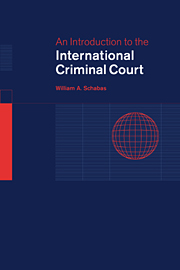Book contents
- Frontmatter
- Contents
- Preface
- List of abbreviations
- 1 Creation of the Court
- 2 Crimes prosecuted by the Court
- 3 Jurisdiction and admissibility
- 4 General principles of criminal law
- 5 Investigation and pre-trial procedure
- 6 Trial and appeal
- 7 Punishment and the rights of victims
- 8 Structure and administration of the Court
- Appendices
- Bibliography
- Index
3 - Jurisdiction and admissibility
Published online by Cambridge University Press: 05 June 2012
- Frontmatter
- Contents
- Preface
- List of abbreviations
- 1 Creation of the Court
- 2 Crimes prosecuted by the Court
- 3 Jurisdiction and admissibility
- 4 General principles of criminal law
- 5 Investigation and pre-trial procedure
- 6 Trial and appeal
- 7 Punishment and the rights of victims
- 8 Structure and administration of the Court
- Appendices
- Bibliography
- Index
Summary
One of the most delicate issues in the creation of the International Criminal Court was the determination of its territorial and personal jurisdiction. Although there were useful models for many aspects of international justice, never before had the international community attempted to create a court with such general scope and application. The Nuremberg Tribunal had exercised jurisdiction ‘to try and punish persons who, acting in the interests of the European Axis countries, whether as individuals or as members of organizations’ had committed one of the crimes within the court's subject matter jurisdiction. Thus, its jurisdiction was personal in nature; defendants had to have acted in the interests of the European Axis countries. The jurisdiction of the International Criminal Tribunal for the Former Yugoslavia is confined to crimes committed on the territory of the former Yugoslavia, subsequent to 1991. The jurisdiction is therefore territorial in nature. The International Criminal Tribunal for Rwanda has jurisdiction over crimes committed in Rwanda during 1994, and over crimes committed by Rwandan nationals in neighbouring countries in the same period. Accordingly, its jurisdiction is both territorial and personal.
The basic difference with these precedents is that the International Criminal Court is being created with the consent of those who will themselves be subject to its jurisdiction. They have agreed that it is crimes committed on their territory, or by their nationals, that may be prosecuted. These are the fundamentals of the Court's jurisdiction. The jurisdiction that the international community has accepted for its new Court is narrower than the jurisdiction that individual States are entitled to exercise with respect to the same crimes.
- Type
- Chapter
- Information
- An Introduction to the International Criminal Court , pp. 54 - 70Publisher: Cambridge University PressPrint publication year: 2001
- 1
- Cited by

